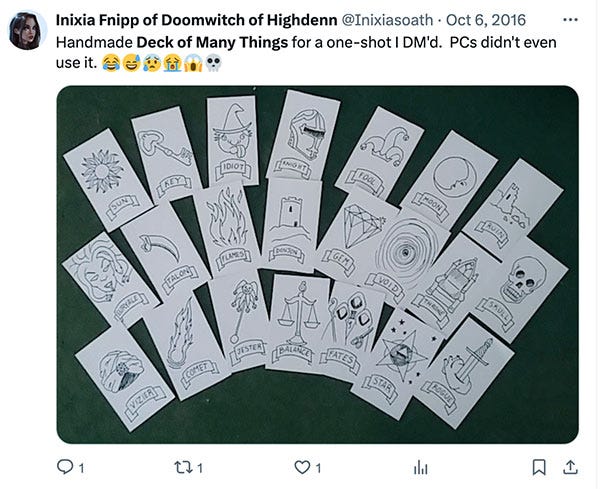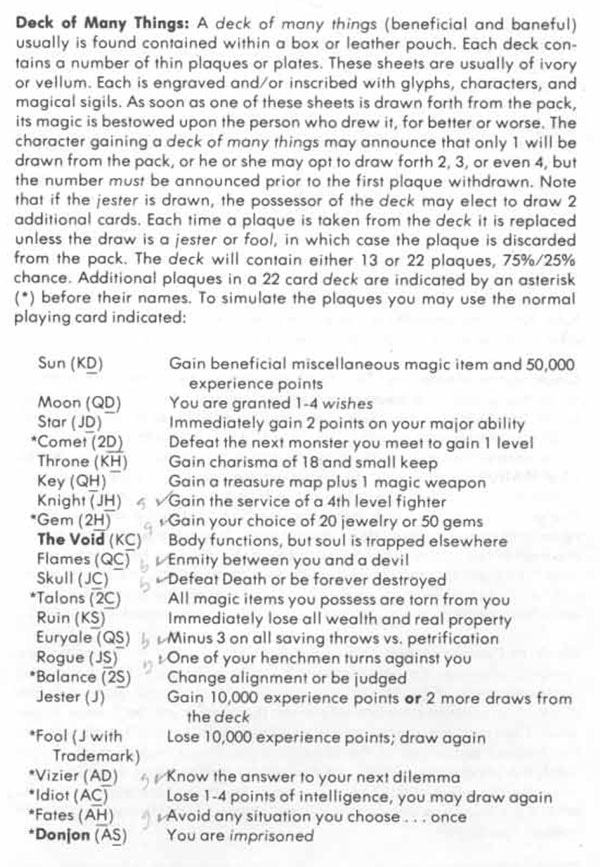The Deck of Many Things: Peak Game Design
What is Dungeons & Dragons for? Why not just get crazy with it?

The Deck of Many Things is one of the greatest designs in all of gaming.
Created by Rob Kuntz and Gary Gygax and published in 1975, it dates back to the earliest days of Dungeons & Dragons. It was created back when everything was new and nobody knew how to do anything and all writers just had to navigate by dead reckoning. Along the way, they stumbled upon all sorts of strange genius.
I often complain about modern design being too over-balanced and tight-assed. There's too much control-freakery in modern games. So I want to sing the praises of the craziest of all designs.
So What Is It?
It's a magic item in Dungeons & Dragons. One of the rare, powerful ones.
In its original form (which has remained mostly blissfully unchanged), it's a deck of 22 cards. You can choose to draw up to four of them. Each one has a powerful effect. You can get incredible wealth, wishes, or powerful, permanent blessings. You can also just get destroyed.
Once all players have drawn their cards or you draw one of the two REALLY bad ones, the Deck vanishes.
It's Russian Roulette in game form. Awesome rewards or utter ruin.
For example, the last time I was in a game where we got one, two members of my group got a free level out of it. One got totally rich. One got a permanent enemy who would stalk us through future adventures. And my character permanently lost a leg.
To be clear: Once this item is introduced, it will permanently change the game it is in. So the draws don't just pose risk for the players. They also threaten the Dungeon Master.
So Let's Cover The Obvious
The Deck is great theater. You have to come up with cards and set them up on the table. The players then draw them in reality, with their own hands.
It is gripping. I can guarantee your players will give you their total undivided attention. Nobody will be checking Instagram when the draws are happening.
It will shake things up. For everyone. Whether you want it to or not.
So Would You Draw From It?
So here's a question, assuming you play or have played D&D. Picture yourself playing your beloved character and the deck shows up. Glory or destruction face you.
Do you draw?
If You Said 'No' ...
Think about why.
No, really. Think about it. Because remember, none of this is real. As I often say, "I don't care that much if my character dies. All I need to make a new one is a sheet of paper. I own lots of sheets of paper."
If you are spending your time engaged in this pleasant but somewhat silly ritualized make-believe, what, exactly, are you trying to get out of it?

The Power Of Fantasy And Make-Believe
To understand why the Deck is such an iconic creation, ask this question: What is the point of fantasy?
Fantasy is a human universal. All cultures have tales of heroes, gods, and monsters, going back to earliest history. Isn't it a little odd that humans are compelled so strongly to tell each other stories of the unreal. What do we get out of it?
I believe the power of fantasy is that it uses metaphor and analogy to deal with difficult, painful realities in a powerful way without looking at them too directly.
The stories of Icarus and Phaethon are silly. A giant labyrinth? Wax wings? Dragging the sun across the sky with a chariot? This is nonsense. But there is something about giving a lesson in a surreal way that slams a message into our brains more effectively than a thousand dry, didactic speeches ever will.
(This is why attempts to make orcs and goblins in D&D less "racist" are so pointless. The "evil" races are a manifestation of the occasional need to fight for our survival, on an individual or national level. Any people who blunder into a real war, where tragedy is constant and survival is on the line, will suddenly rediscover the need for the idea of an "orc.")
What Is The Deck Of Many Things A Metaphor For?
Life.
Life is full of choices that lead to reward or disaster. In fact, such events are the signposts of your life. To take that job? Go to college? Start a business? Close it? Move? Join the Army? Get married? Have children? Or not?
These choices are important, but they are only rarely fun. Even the joyful ones, like marriage, tend to also be full of terror. Not to mention having a kid.
But you do have to make those choices sooner or later.
The Deck of Many Things is mental practice. Because, remember, IT DOESN'T MATTER. All you are risking is a sheet of paper.
Drawing from it lets you practice risking all. And, more importantly, it lets you see that losing is tolerable. If the Deck destroys your character, you get might more out of it than if you get the treasures. It lets you practice overcoming a small loss, which gives a tiny bit of reassurance that you can handle the real losses when they (invariably) come.

A Message For Any Normies Reading This
Yes, I am talking about using this silly game to learn life lessons and understand the world. Yes, this is very odd. Did you really need me to tell you that the vast majority of people who play D&D are kind of odd?
Dungeons & Dragons is best understood as a sort of structured socializing for people who are highly introverted or have problems coping with other people. Some kids learn lessons about life, communication, and perseverance by doing sports. Others play D&D.
I'm not going to pretend it isn't strange. I believe, based on long observation, that the sports played by kids vs nerdy kids, in the long run, result in equal happiness.
Also, It's Good For Campaigns
Some Dungeon Masters are afraid to use the deck because it'll shake their campaign up.
Yeah? Well ... good! I've never been in a campaign that couldn't use a good kick in the pants every once in a while. Suppose one player loses their soul and must go on a quest to get it back. (Void.) Another gets a treasure map. (Key.) Another gets the hatred of a powerful devil. (Flames.)
This is a lot of chaos. Embrace it! This can be the springboard for a bunch of new adventures. You'll have to scramble and hustle a bit, but isn't that fun? Why are you so determined to have total control of a fantasy? Doesn't that defeat the purpose of fantasy, even a little? Stagnant campaigns have a nasty tendency to end.
Nobody Could Make This Design Today
I believe that a lot of the reason Dungeons & Dragons is still so popular is because of the weird old stuff. The cruft and wild ideas of designers who did their best and are no longer able to hear our complaints.
I think it's a good idea to be unfair sometimes. Sometimes people should get more or less than they deserve. If your game isn't PvP, I think you should put in at least two times when the player gets something that feels too good and one time when the player gets unfairly screwed over.
(From Software really gets this. That's why their brutal, nasty, freakshow games are mainstream hits now.)
And if you play D&D and get a chance to draw from the Deck, I really hope you do it. Because then you'll know you're a person who can.
We’ve taken a long break for vacation and hard work on our next game. We’re getting back into the PR grind. We’re doing a Kickstarter in about a month, and we’d love your support. Subscribe to this free newsletter to be sure to learn about it.


No. No I will not draw from the Deck of Many Things. Why? For one, Murphy’s Law thinks your “clearly defined odds” and “mathematical probability” are positively adorable, and you can go to the donjon about it! For two, character investment is a big part of my enjoyment of the game, and potentially ruining a character I’m invested in is not worth the risk.
“I don’t care that much if my character dies” equates to “I don’t care that much if my character lives” which evens out to “I don’t care that much about my character either way.” And that’s just not my mindset. DM/chance just unceremoniously flushed Bob #3415 down the toilet? Oh well! Everyone get ready to meet his identical twin brother: Bob #3416!
If that’s how you prefer to play, then sure – go nuts. “I’m Johnny Knoxvillie and this is Dungeons and Dragons” isn’t wrong as long as you’re having fun. It just isn’t for everyone. And it certainly isn’t for me.
I was introduced to RPGs via a homebrew system a friend thought up that consisted mostly of a couple cool ideas and a grid of numbers. It was years before I played actual D&D (or AD&D as it was then called), but within a few months of my starting playing one of the rotating GMs used the Deck of Many Things to, as you put it, “shake up the campaign”. It was Russian Roulette with an unexpectedly cooperative bent as players who had wishes would use them to offset some of the worse effects (prolly not strictly according to Hoyle, but it worked). That session skyrocketed PC power levels and resources and set us off on totally new adventures.
Since that was my introduction, that’s how I’ve used it as well.
More recently, in a D&D 5e game, the DM broke out a subset of the DoMT and gave us a choice of 2 cards. So, yeah, I chose to pull 2 cards. And the first one basically sat me out the rest of the session as the party had to come find me. I hate being benched, but it was still a fun session overall.
I don’t know if the math supports pulling cards from the DoMT as an EV+ proposition, but, hell yeah, count me in. =)